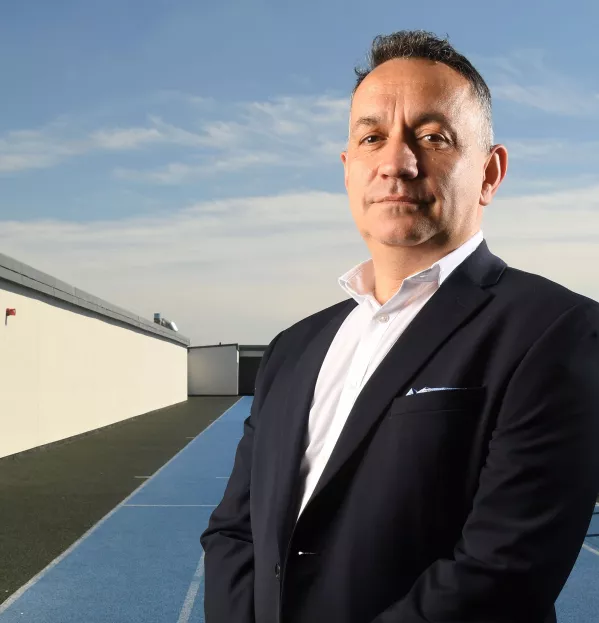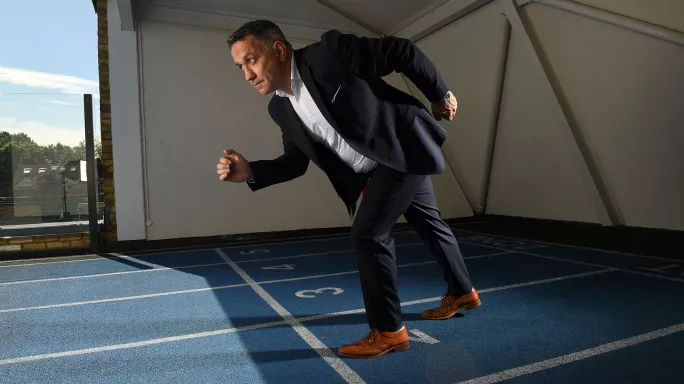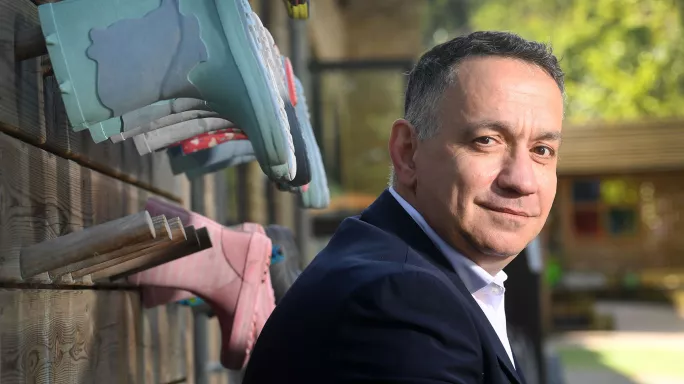- Home
- Leadership
- Strategy
- 10 questions with...Lee Mason-Ellis
10 questions with...Lee Mason-Ellis

Lee Mason-Ellis is the chief executive officer of The Pioneer Academy, a multi-academy trust with 17 primary schools across London, Kent, Surrey and Brighton. He has held this role since 2011.
Before becoming CEO of the MAT, Mason-Ellis was the headteacher of Stewart Fleming Primary School in Anerley, south-east London.
Answering Tes’ 10 questions, he discusses how a love of rugby league got him through school, why he regrets a trust-wide curriculum change and how misconceptions about the MAT system cause fragmentation.
1. Who was your most memorable teacher and why?
My secondary school physics teacher, Mr Lythgow. I was hopeless at physics - but he was also the rugby league coach.
He got me into rugby league, and I found out I was quite good at it. Playing rugby got me all the way through my A levels, and even got me into university, because the person who interviewed me was a rugby union fan and the university rugby union team wasn’t doing well…
The confidence I found in rugby carried me through the rest of school. Mr Lythgow showed me kindness in an era - this was the mid-Eighties - when kindness wasn’t something teachers always showed.
2. What were the best and worst things about your time at school?
The best was playing sport, working as a team. Doing individual sports such as sprinting also gave me the opportunity to be personally disciplined, and to learn how to cope with pressure.
The worst was the unkindness, both from pupils and staff. It was brutal, physically and verbally. I have a lisp, and that was mentioned every day of my life at secondary school. Things like that begin to erode your confidence.
That experience has driven me to ensure my schools are safe and happy, and that children have the opportunity to learn.
3. Why do you work in education?
When I came to London from Salford I was obsessed with sport - sprinting and playing rugby. But I realised I wasn’t going to turn pro. I wasn’t good enough. So then I looked at doing a sports degree, and I found one combined with education.
I did the primary version and absolutely loved it. I found lots of things in my life difficult - I’m not a natural learner. But I found I could teach and I could articulate meaning reasonably naturally.

And because of my own school experiences, and coming from a working-class background, I wanted to make a difference. I love that as a teacher you can make a difference every single day.
4. What are you proudest of in your career and what do you regret?
I’m really proud of the fact that as an organisation, we’ve built a really strong culture where we are prepared to take a risk for the betterment of children and their communities.
More personally, I am really proud of the OBE I received in 2022. That was a great day for me and my family. I was given the award by Princess Anne, who asked me some very interesting questions about the academy system.
In terms of regrets, a few years ago we moved away from a standardised curriculum because we wanted our schools to have more of a say about what they taught. But we didn’t get the pedagogical model right, and we had a couple of Ofsted inspections that weren’t as good as they should have been.
It was a mistake of mine. We’ve gone back and changed the foundations of the model, and we’re now stronger because of that.
More Tes’ 10 questions:
- Lee Wilson, CEO of Outwood Grange Academies Trust
- Carol Dewhurst, CEO of Bradford Diocesan Academies Trust
- Moira Marder, CEO of the Ted Wragg Trust
5. Who would be your colleagues in your perfect school staffroom?
My ideal staff are those that are focused on putting the needs of the children first and doing whatever is needed to make sure that they’re safe, happy and learning.
That’s what I’ve already got. My schools are full of dedicated people, and not just the teachers, but also the TAs and the non-education staff. Lots of these people have been working for us for 10 or 15 years, which is a testament to our culture.
6. What would you say are the best aspects of our school system today?
The best thing is that, because we have a MAT system, we have the opportunity to influence and support more children. Staff collaborate more and that improves outcomes for the children.
It also reduces workloads for staff and gives more opportunities for career progression. For example, three teachers who worked at Stewart Fleming Primary when I was head there, are now heads in my other schools. Within the trust, our retention rates are fantastic.
7. What about the worst?
The worst thing is the fragmentation in the system: the “them” and “us” of local authority schools and academies. That friction has stopped a lot of collaboration.
It has also led to fear and misconceptions. For instance, when we were looking to take on a school in Brighton, we were told if we did all the children would leave and staff would resign.

Of course, none of that happened. The children have stayed - in fact, we get more children every year - and only a couple of staff left.
The politicisation of the school system is not doing us any good at all.
8. Who in education has influenced you the most?
When I first became a head I wanted to do things differently and I got in a bit of trouble.
I was given a school improvement partner from the local authority, Pauline Watts. She’s the best person I’ve ever met in education. She looked forensically at the school, from books to planning, and she taught me everything.
She’s retired now but I saw her again last year which was amazing. She’s still far more knowledgeable than me.
9. If you became education secretary, what would be the first thing you would do?
I would take education out of political hands. I would create an independent school review body, with Sir David Carter as its head, that would create a 10-year strategic plan for education.
It would guarantee school funding on a minimum of a three-year model, rather than the one-year model we have currently, when we never know what’s coming up halfway through the year.
10. What will our schools be like in 30 years?
I’d like to see the teacher profession respected. That would help with recruitment and retention.
In 2010, if I ran a job advert at a “good” school, I’d get 30 or 35 applicants. Nowadays, even if a school is “outstanding”, we might get five to 10 and, in some schools, you might get none. Changing the public perception of teaching would really help with that.
I also think there needs to be an increased focus on making sure children from deprived backgrounds are not only attending school, but doing well. And that comes down to funding. Pupil premium funding hasn’t increased enough to ensure that is happening - I think it needs to.
You need a Tes subscription to read this article
Subscribe now to read this article and get other subscriber-only content:
- Unlimited access to all Tes magazine content
- Exclusive subscriber-only stories
- Award-winning email newsletters
Already a subscriber? Log in
You need a subscription to read this article
Subscribe now to read this article and get other subscriber-only content, including:
- Unlimited access to all Tes magazine content
- Exclusive subscriber-only stories
- Award-winning email newsletters



